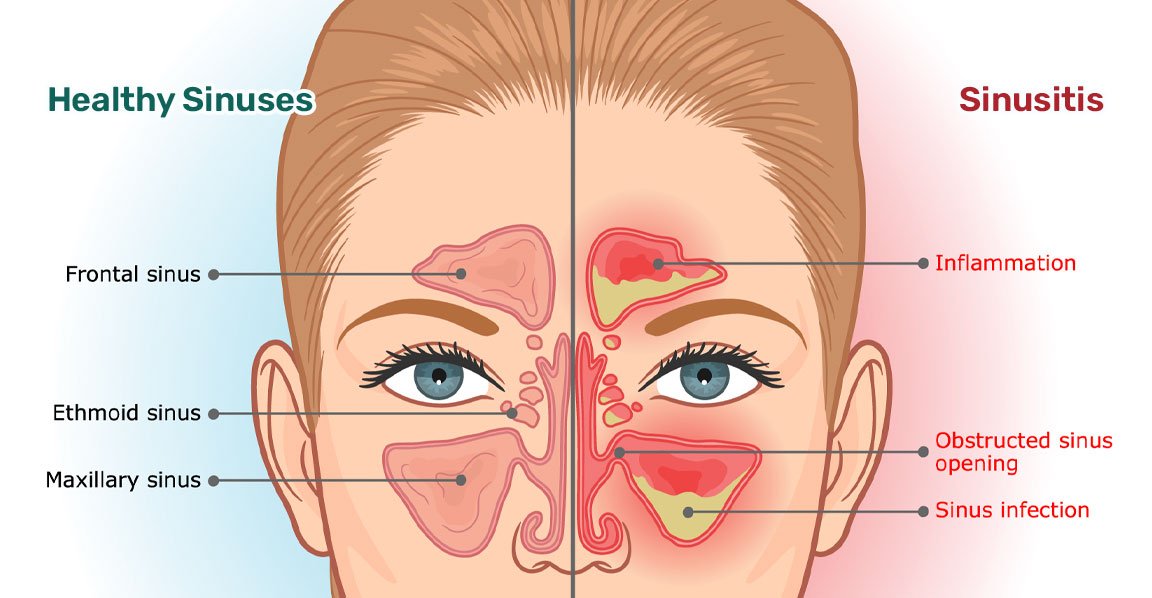Sinus Infection (Sinusitis)
Sinus infections are common and affect both adults and children. Find out what to look out for and when you should seek treatment.
Where are the Sinuses?
There are 4 pairs of sinuses located in various parts of the face:
- 1Behind the forehead and eyebrows
- 2Behind the nose and in front of the brain
- 3On both sides of the nose bridge
- 4Within the bony structure of the cheeks

What Do the Sinuses Do?
Healthy sinuses are lined with a thin layer of mucus that traps dust, bacteria and other particles in the air. Tiny hair-like structures in the sinuses sweep the mucus (and everything trapped in it) towards openings that lead to the back of the throat. From there, it slides down into the stomach.
This continuous process is a normal body function that helps:
Keep dirt and pollutants from the nose
Humidifies and filters the air that enters the lungs
Maintain the health and comfort of the sinuses
Keep our voice resonant
What Is Sinusitis?
Sinusitis, also known as rhinosinusitis or a sinus infection, occurs when the tissue lining the sinuses becomes inflamed due to viral, bacterial, or fungal infections. This inflammation causes the sinus tissues to swell, blocking the sinus openings and trapping mucus. The trapped mucus then becomes a breeding ground for further infection, making symptoms worse.
What Are the Types of Sinus Infections?
Sinusitis can be categorised into different types based on duration.
- Acute Sinusitis - This is a temporary swelling of the sinuses, typically lasting less than 4 weeks. It is often caused by a viral infection such as the common cold but it can also be caused by bacteria.
- Chronic Sinusitis - This is a long-term condition that occurs when symptoms become more frequent or worse. Symptoms of chronic sinusitis often last for more than 12 weeks or continue to recur.
- Subacute Sinusitis - This type falls between acute and chronic sinusitis. Subacute sinusitis may take between 4 and 12 weeks to fully resolve.
- Recurrent Sinusitis - In this type of sinusitis, individuals experience recurrent infections or inflammation up to four times a year. Each episode lasts less than 14 days and fully resolves before the next one occurs.

What Are the Symptoms of Sinusitis?
- 1Facial pain, pressure or fullness
- 2Stuffy nose and cloudy/coloured discharge
- 3Post-nasal drip
- 4Headache and fever
- 5Bad breath and loss of smell
- 6Sore throat and cough
- 7Fatigue
The moment the sinuses become blocked or inflamed; mucus, bacteria and pus become trapped and accumulate, causing an infection known as sinusitis.
Common Causes of Sinusitis
Sinus infections may result from various factors, such as:
- Viral Infections - Viruses such as those of the common cold and flu can cause inflammation and blockage in the sinus drainage.
- Bacterial Infections - In some cases, a bacterial infection can develop following a viral infection.
- Fungal Infections - Certain fungi can infect the sinuses directly or cause an allergic reaction.
Risk factors for Sinusitis
The following factors can increase a person's risk of developing a sinus infection:
- Allergies - Conditions like hay fever or allergic rhinitis can inflame the nasal passages, making them more prone to infection.
- Asthma - People with asthma are often more susceptible to respiratory infections, including sinusitis.
- Weakened immune system - A compromised immune system, whether due to illness, medication, or other factors, can make it harder to fight off infections.
- Nasal Polyps - These growths in the nasal passages can block sinus opening, increasing the risk of infection.
- Environmental Factors - Exposure to pollutants, smoke, and irritants can irritate the sinus lining and lead to infections.
- Structural Issues - Conditions like a deviated septum can obstruct airflow and sinus opening, making the individual more susceptible to sinusitis.
How Is a Sinus Infection Diagnosed?
First, the ENT doctor will review the patient's symptoms, inquire about any history of allergies or other relevant medical conditions, and perform a physical examination. Additional diagnostic tests may then be performed, including:
- Nasal Endoscopy - An endoscope is inserted through the nostrils to examine the nasal passages for any structural issues or obstructions.
- Imaging Tests (CT scan or X-ray) - These tests provide detailed images of the sinuses to help identify any structural abnormalities that may be contributing to sinusitis.
- Laboratory Tests - Samples of bodily fluids or tissues may be taken to identify the specific bacteria, fungi, or viruses that cause the infection. This information can help guide treatment decisions.
- Allergy Testing - If allergies are suspected as a contributing factor, allergy testing can be done to identify allergens that trigger sinusitis. It can be useful in developing a comprehensive treatment plan, including allergy medications or immunotherapy.
Treatment Options for Sinusitis
The treatment for sinusitis varies depending on the severity and duration of symptoms.
- Home Remedies and Self-Care - In some cases, patients can explore home remedies, like applying a warm compress to the face or using a humidifier, to relieve discomfort and promote sinus infection healing.
- Medications - Over-the-counter medications such as pain relievers, decongestants, antibiotics, antihistamines can help manage symptoms, especially in acute cases. They provide quick relief by reducing nasal swelling, pain, and inflammation.
- Allergy Treatments - Immunotherapy treats allergy-related sinusitis by gradually exposing the body to allergens, building tolerance and reducing symptoms over time.
- Surgical Treatments - Surgery addresses chronic sinusitis by enlarging sinus openings and draining sinuses.
Seek medical attention if you’ve been fighting off a cold and start noticing symptoms of a sinus infection – your doctor will provide an accurate diagnosis and get you started on an appropriate treatment plan.
Contact Information
Orchard
3 Mount Elizabeth,Mount Elizabeth Medical Centre, Suite 14-17, Singapore 228510
| Tel | : | +65 6474 6116 |
| Fax | : | +65 6737 0816 |
Mount Alvernia
820 Thomson Road, #07-58Mount Alvernia Hospital, Medical Centre D, Singapore 574623
| Tel | : | +65 6252 5528 |
| Fax | : | +65 6252 5526 |
| Whatsapp / SMS | : | +65 9642 3362 |
| : | appointment@luketan-ent.com.sg | |
| Emergency Tel | : | +65 6535 8833 |
Operating Hours
| Monday to Friday | : | 9:00 am to 5:00 pm |
| Saturday | : | 9:00 am to 12 Noon |
| Sunday & Public Holiday | : | Closed |
Close for lunch 1pm to 2pm
Need Further Assistance?
Fill out the enquiry form below, or call us at 64746116, if you require a detailed assessment and evidence-based relief of your sinus problems.
